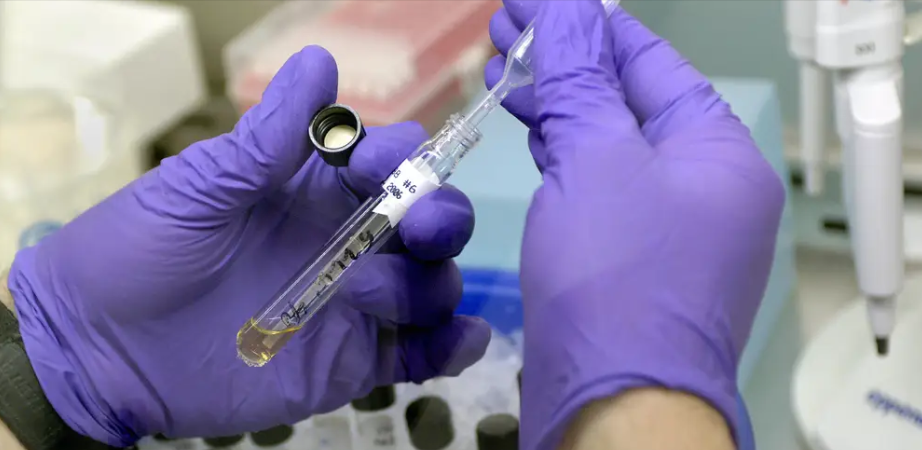The flu vaccine is not 100% effective but you should still get it every year
Nancy Averett From Business Insider

Getty/ STAN HONDA / Staff
- How effective the flu vaccine is will vary from year to year. It can range anywhere from 20% to 60% effective.
- Each year, flu vaccines are designed to protect against three to four different viral strains of influenza. But sometimes the viral strains that end up in the flu vaccine don’t match the viral strains that make people sick.
- The CDC says it’s too soon to tell how effective this year’s flu vaccine will be but encourages everyone who is eligible to get a flu vaccine.
- This article was reviewed by Tania Elliott, MD, who specializes in infectious diseases related to allergies and immunology for internal medicine at NYU Langone Health.
- Visit Insider’s homepage for more stories.
The flu vaccine is the most effective way to protect yourself against infection from the influenza virus. The CDC says that it’s too early to measure the effectiveness of this year’s flu shot, but Helen Branswell at Stat reports that if the main flu virus this year is a type of H1N1, that the vaccine should be fairly effective.
But no matter how effective the flu vaccine is, it’s not 100% effective. In fact, it’s not even close.
How effective is the flu vaccine?
How effective the flu vaccine is will vary from year to year.
In a good year, when the flu vaccine is most effective, it can reduce your risk of getting sick by 60%. That means you have at least a 40% chance of getting the flu if you are exposed to it, even if you’re vaccinated.
But that’s better than a bad year when the flu vaccine’s effectiveness can dip below 20%, meaning you still have more than an 80% chance of getting the flu if you are exposed to it. So why the big difference?
For most healthy adults, the chance of getting the flu after being vaccinated largely depends on the vaccine itself.
Each year, flu vaccines are designed to protect against three to four different viral strains of influenza. Most often, the World Health Organization selects those strains for the upcoming flu season in the Northern Hemisphere from viruses that have been circulating in the Southern Hemisphere in the previous six months.
But sometimes the viral strains that end up in the flu vaccine for the US and the rest of the Northern Hemisphere don’t match the viral strains that end up circulating come flu season. This can happen when a new viral strain arises at the wrong time.
“Every once in a while there’s a surprise and something emerges late in the season that’s unexpected, and that’s one reason the vaccine is not 100% effective,” says Graham Snyder, MD, medical director of infection prevention at the University of Pittsburgh Department of Medicine.
In this case, when the strains in the vaccine don’t match the strains making people sick, it can mean a less effective flu vaccine — well below 60% effectiveness — and a greater chance of still getting the flu after your shot.
For instance, this is exactly what happened during the 2014-15 flu season. That year there were multiple strains of a type of flu virus, called H3N2, going around. But the vaccine didn’t have a strain that matched most of the H3N2 strains that were making people sick. So researchers estimated that the flu vaccine was only 13% effectiveagainst H3N2 that season.
This helps explain why the 2014-15 flu season had some of thehighest percentages of hospitalizations and deaths from influenza compared to the five flu seasons before it.
That said, during the more moderate 2016-17 flu season, when the flu vaccine was estimated to be 40% overall effective, flu vaccines prevented an estimated 5.3 million flu-related illnesses and 2.6 million medical visits, according to the CDC.
For this year’s vaccine, the FDA has recommended it contain a type of H1N1, H3N2, and two versions of flu-type B. So the effectiveness of this year’s vaccine will depend on which flu virus circulates this flu season.
For more information about this year’s flu vaccine, visit the CDC’s website.
What are other flu vaccine options?

The nasal-spray vaccine can be an ideal alternative for people afraid of getting the flu shot, including children over the age of 2, but how effective it is can vary year to year.
For example, a 2019 study published in the Official Journal of the American Academy of Pediatrics found that the nasal spray vaccine for the 2018-19 flu season was less effective than the flu shot in protecting children from getting two common strains of the flu, H1N1 and H3N2. But the nasal spray has since been reformulated for upcoming seasons.
The nasal vaccine is a live, weakened version of the virus, and is not recommended in anyone who has a weakened immune system, pregnancy, or chronic medical problems.
There is also a high-dose flu shot that contains more virus particles than the regular shot so that the immune system is stimulated more rigorously. This inoculation is for people aged 65 and older whose immune system may not be as strong. When this population receives a regular-dose flu shot, they may not produce as many protective antibodies and therefore are at a higher risk of getting sick with the flu.
A 2014 study published in the New England Journal of Medicine showed that people 65 and older who received the high-dose shot suffered 24% overall fewer illnesses from influenza compared to older adults who received the standard dose.
“I encourage people to talk to their doctor about what type of vaccine is best for them,” Snyder says.
For more on this story go to; https://www.businessinsider.com/how-effective-is-the-flu-shot?utm_source=feedburner&%3Butm_medium=referral&utm_medium=feed&utm_campaign=Feed%3A+businessinsider+%28Business+Insider%29





